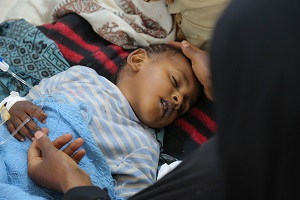UN Leaders appeal for immediate lifting of humanitarian blockade in Yemen – Millions of lives at imminent risk
Joint statement from agency heads: WHO Director General Dr. Tedros Adhanom, UNICEF Executive Director Anthony Lake and WFP Executive Director David Beasley
“While the Saudi-led military coalition has partially lifted the recent blockade of Yemen, closure of much of the country’s air, sea and land ports is making an already catastrophic situation far worse. The space and access we need to deliver humanitarian assistance is being choked off, threatening the lives of millions of vulnerable children and families.

“Together, we issue another urgent appeal for the coalition to permit entry of lifesaving supplies to Yemen in response to what is now the worst humanitarian crisis in the world. The supplies, which include medicines, vaccines and food, are essential to staving off disease and starvation. Without them, untold thousands of innocent victims, among them many children, will die.
“More than 20 million people, including over 11 million children, are in need of urgent humanitarian assistance. At least 14.8 million are without basic healthcare and an outbreak of cholera has resulted in more than 900,000 suspected cases.
“Some 17 million people do not know where their next meal is coming from and 7 million are totally dependent on food assistance. Severe acute malnutrition is threatening the lives of almost 400,000 children. As supplies run low, food prices rise dramatically, putting thousands more at risk.
“Even with a partial lifting of the blockade, the World Food Programme estimates that an additional 3.2 million people will be pushed into hunger. If left untreated, 150,000 malnourished children could die within the coming months. To deprive this many from the basic means of survival is an unconscionable act and a violation of humanitarian principles and law.
“Fuel, medicine and food – all of which are now blocked from entry – are desperately needed to keep people alive. Without fuel, the vaccine cold chain, water supply systems and waste water treatment plants will stop functioning. And without food and safe water, the threat of famine grows by the day.
“We are already seeing the humanitarian consequences of the blockade. Diphtheria is spreading fast with 120 clinically diagnosed cases and 14 deaths – mostly children – in the last weeks. We have vaccines and medicines in transit to Yemen, but they are blocked from entry. At least one million children are now at risk of contracting the disease.
“The world’s largest cholera outbreak is waning and the number of new cases has declined for the 8th consecutive week from a peak of more than 900,000 suspected cases. If the embargo is not lifted cholera will flare up once again.
“All of the country’s ports – including those in areas held by the opposition – should be reopened without delay. This is the only way that UN-chartered ships can deliver the vital humanitarian cargo that the population needs to survive. Flights from the United Nations Humanitarian Air Service - into and out of Yemen - should be given immediate clearance to resume. UN staff who are based in Yemen have been unable to move, even if they need urgent medical attention.
“The clock is ticking and stocks of medical, food and other humanitarian supplies are already running low. The cost of this blockade is being measured in the number of lives that are lost.
“If any of us in our daily lives saw a child whose life was at immediate risk, would we not try to save her? In Yemen we are talking about hundreds of thousands of children, if not more. We have the lifesaving food, medicine and supplies needed to save them, but we must have the access that is currently being denied.
“On behalf of all those whose lives are at imminent risk, we reiterate our appeal to allow humanitarian access in Yemen without further delay.”
Source:United Nations Children's Fund
- 236 reads
Human Rights
Fostering a More Humane World: The 28th Eurasian Economic Summi

Conscience, Hope, and Action: Keys to Global Peace and Sustainability

Ringing FOWPAL’s Peace Bell for the World:Nobel Peace Prize Laureates’ Visions and Actions

Protecting the World’s Cultural Diversity for a Sustainable Future

Puppet Show I International Friendship Day 2020

